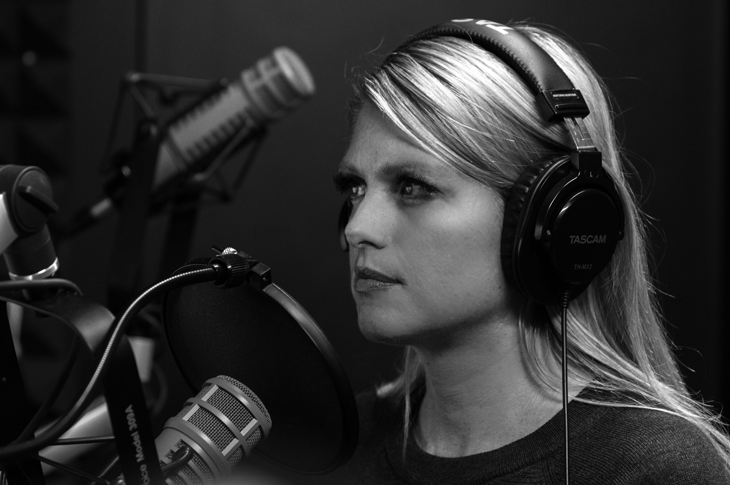The power of voice: podcasting tips from a journalist

Nancy Hixt is giving victims a voice using her own.
Her celebrated podcast, Crime Beat, pulls back the curtain on some of Canada’s most high-profile criminal cases — all of which Hixt covered personally throughout her career as a crime reporter for Global News. Her priority is sharing stories on behalf of the victims who no longer can — the stories that are hard to tell.
“I work to shine light on the darkest places,” says Hixt, SAIT alumna (Cinema, TV, Stage and Radio, ’96).
Hixt’s in-depth storytelling is certainly resonating with audiences. Now in its second season, Crime Beat has been featured multiple times in Apple Podcasts’ “Best Listens of 2019,” claiming top spot in the true crime category.
Podcasts in journalism
More than one third of Canadian adults listen to podcasts according to The Canadian Podcast Listener 2019. The platform’s popularity and episodic format present a unique opportunity for journalists to reach new audiences by diving deeper into the stories they cover, sharing comprehensive details and first-person accounts from the people involved.
“Podcasts are highly personal and an intimate way of accessing content,” says Hixt.
Podcasting is one of the latest trends to be adopted by an industry constantly embracing digital disruption. Today’s journalists must be nimble and tech-savvy, preparing content for channels beyond those considered traditional, such as television and print.
“Gone are the days when a TV reporter writes one story for the six o’clock news,” says Hixt.
After more than two decades in television news, where stories are bound by time constraints, Hixt was ready to embrace the digital platform.
She launched Crime Beat in March 2019 to explore longer-form journalism. The roughly hour-long episodes allow her to share a behind-the-scenes look at crime reporting, including the doors she knocks on and the people she meets.
“I’ve always had to condense information and interviews down to fit into my two-minute TV time slot,” says Hixt. “With Crime Beat, I can take the time to let you get to know the people involved in a case.”
Skills for storytelling
While producing content for podcasts draws on a different skill set than television or radio, at the heart of every one of these platforms is good journalism and storytelling — skills Hixt developed as a SAIT student.
“SAIT gave me the tools necessary to begin my career,” she says.
It’s the art of journalistic storytelling that has made listeners tune in to Crime Beat more than three million times, giving Hixt three million chances to share the stories of victims who might have otherwise been lost to time.
“A podcast is an emotional journey that doesn’t compare to any other platform I’ve reported for,” says Hixt. “At the end of every episode, you will feel like you got to personally meet these victims and their families.”
Hit “record”
Learn to share stories on a new platform with these tips from Hixt on starting out:
Do your market research.
Listen to other podcasts on the topic you’re hoping to cover. Is your idea drastically different? Can you offer a new perspective?
Master those journalism skills.
If you’re hoping to launch a journalism-based podcast, you’ll benefit from traditional journalism skills learned in a classroom.
“Newsroom experience is essential to learn how to dig up stories and fact check,” says Hixt.
Whether starting out on your career path or looking to pursue a new direction, SAIT can help you earn the skills you need to make an impact in podcasting. Check out our Journalism diploma program or Digital Audio Certificate of Achievement.
Plan ahead.
Respect your audience’s time, including only the most interesting and impactful information. Plan out each episode prior to recording and put what you’ll say in writing.
“It’s easier to edit a document than to edit hours of audio,” Hixt says.
Don’t be afraid to edit.
Hixt calls editing the number one rule of podcasting. Get your hands on editing software — here are some available for free.
Get social.
Promote your work on social media and engage with your audience.
“If you want people to take the time to listen to your content, take the time to answer their messages,” says Hixt.
What you need to know before you hit "record"
If podcasting is in your future, be sure to check What Works: So you want to start a podcast.
Crime Beat is a Global News and Curiouscast Podcast Network production. Find it wherever podcasts are available.

Oki, Âba wathtech, Danit'ada, Tawnshi, Hello.
SAIT is located on the traditional territories of the Niitsitapi (Blackfoot) and the people of Treaty 7 which includes the Siksika, the Piikani, the Kainai, the Tsuut’ina and the Îyârhe Nakoda of Bearspaw, Chiniki and Goodstoney.
We are situated in an area the Blackfoot tribes traditionally called Moh’kinsstis, where the Bow River meets the Elbow River. We now call it the city of Calgary, which is also home to the Métis Nation of Alberta.